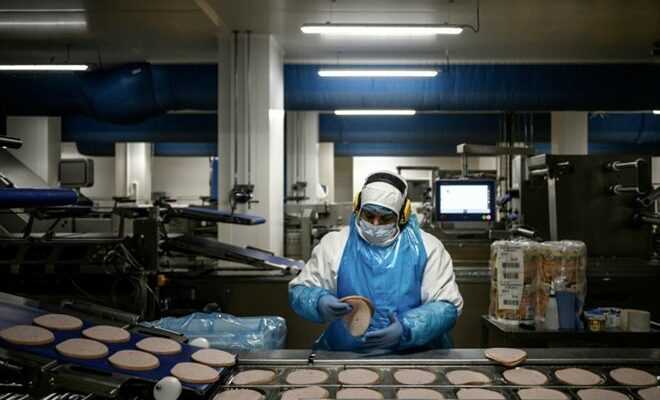For oriental pastries, the month of Ramadan represents a prosperous period of commercial activity (AFP/Archives/CHARLY TRIBALLEAU)
Gazelle horns, baklawa, makroud, turkey or chicken ham… for oriental pastries and halal charcuterie, the month of Ramadan and its great Eid-el-Fitr celebration represent a prosperous period of activity commercial.
“The turnover can increase up to five times an ordinary month”, rejoices Rahma Bouzid, the director of the Masmoudi pastry shop which employs 900 employees in Tunisia and distributes its sweets in three points of sale in France.
In the Lyon store, customers flock to the approach of the celebration of the breaking of the fast, scheduled for Monday.
“It’s a moment we’re going to celebrate with the family, so on this occasion, of course, we’re going to take out the bank cards,” says Mehdi Triki, a 41-year-old doctor who came with the family to buy Tunisian sweets on sale at 39. euro per kilo.
During the holy month of Ramadan, one of the five pillars of Islam, believers are asked to abstain from drinking, eating and having sex, from dawn – as soon as one can “distinguish a white thread from a black thread” says the Koran – until sunset, with evenings marked by hearty meals usually ending with traditional desserts.
The period “makes the year profitable for an oriental pastry shop” because the month of Ramadan represents a “Christmas meal for 30 days”, explains the director of Masmoudi France.
“There are customers that we only see during Ramadan” others only come “the last week, to buy pastries for Eid”.
– “Increased activity” –
The same effervescence at the Halbutche halal butcher’s shop in Saint-Etienne: this trade has “two big months” in the year, in December, for the end-of-year celebrations and during the month of Ramadan, with an increase in activity ” by about 60%” over the two periods, according to Kissou Jalil, manager of this store which focuses on the high end.

An employee of the Isla Délice factory, specializing in halal charcuterie, on April 7, 2022 in Saint-Andrée-sur-Vieux-Jonc, in Ain (AFP/Archives/JEFF PACHOUD)
For the Isla Délice factory specializing in halal charcuterie and based in Ain, Ramadan represents “a 30% increase in activity”, according to Eric Fauchon, the president and CEO of the French leader in charcuterie, frozen foods. and halal meal solutions – in accordance with religious rites from the Koran.
It’s “an important time for our consumers” because “it’s a time when families get together, eat together,” he explains.
The Saint-André-sur-Vieux-jonc factory thus ships 100,000 packages per week during the month of Ramadan, instead of 70 to 80,000 the rest of the year, ham representing 70% of volumes, according to its figures. 70% of the products go to large-scale distribution and 30% to specialized circuits (independent retailers, “ethnic” supermarkets, etc.).
In general, the CEO of Isla Delice sees the halal market as a “dynamic market” in France, with regular growth, in the order of 8 to 10% per year, according to him.
Halal sales increased by 2.9% in 2021, after a boom of +14.9% in 2020, according to figures from the specialist magazine LSA.
France has between five and six million practicing and non-practicing Muslims, according to several studies (Pew Research Center, Institut Montaigne, Insee, Ined), which makes Islam the second religion of the country and of the French Muslim community. the first in Europe.
© 2022 AFP
Did you like this article ? Share it with your friends with the buttons below.




